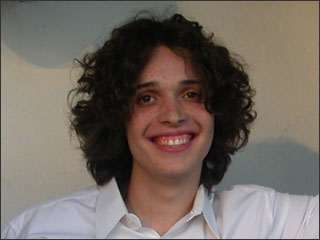 |
| Justin Stein / Vocals and
Bass Guitar |
| |
 ackground
ackground |
| Justin
Stein grew up in a musical home. His father was a country
musician for 17 years before becoming a cantor. He has been
playing bass since he was a child. Now he is a vocal performance
major at CSUN. He performs in his family band, The Rolling Steins
and in a Middle Eastern Jam Ensemble. |
| |
| |
| How
would you describe the Nashuva band? |
| The Nashuva band is
composed of musicians from all walks of life. But we share a
common spiritual sensibility. Each member brings something different
to the ensemble—Middle Eastern music, African music, jazz,
rock, choral music, Eastern European Klezmer music and it all
comes together to form a very unique sound. |
| |
| What
is it like to play music with your brother at Nashuva? |
| Out of all the experiences
I get out of music, playing with my family is one of my favorite
things. My brother and I are very close friends and we love
working together. And being able to work with him at Nashuva
makes the experience all the more close to my heart. |
| |
| How
is Nashuva different from other synagogue experiences you’ve
had? |
| Nashuva creates community.
Everyone seems to be pulled into the same center. People feel
comfortable crying, laughing, dancing. In most settings you
won’t find that. It’s really great to be working
with a rabbi who is so interested in the spirituality of the
service and has such a desire to connect with the community
and all her efforts are related to the spirit. |
| |
| What
have you learned from your experience at Nashuva? |
| Aside from the soulfulness
I receive from playing at the service, I am able to watch the
service and I get the opportunity to hear fantastic sermons.
I get a lot of information and insight from Naomi and one of
the things that impresses me most is not just the words she’s
saying, but how everyone is captivated by what she’s saying.
No one is talking to their neighbor. Everyone is able to receive
her words in a very emotional and spiritual way. |
| |
| What
is it like for you to be in the Nashuva Band? |
| It’s experiencing
spirituality through music. Being able to pray with your instrument.
To express how you feel through music with your peers. Being
part of the Nashuva band has been an amazing experience. You
are a link in a project that moves so many souls. There is a
massive spirituality. My favorite thing is watching how into
it people are. I can feel the energy—it’s shining
and beautiful. Also, I feel that Naomi and I have a partnership.
I’m not working for her; I’m working with her in
creating this experience, this community. |
| |
| What
is your experience of prayer at Nashuva? |
| Nashuva is one of the
only prayer experiences where I’ve been able to feel that
the whole community is connected to each other and to God. Everyone
is on the same page. They are all different ages and backgrounds,
but there is this common bond: God, soul, music. |
| |
| How
is Nashuva an expression of your Judaism? |
| It is a different experience.
The community is so involved. I’ve played in many different
services and often the environment isn’t conducive to
soulfulness. I have a deep interest in contemporary prayer and
that’s what Nashuva is doing—it’s creating
a new tradition without throwing out the old one.
When Naomi first told me she had made new translations of
the prayer service I wasn’t really sure what to expect.
I didn’t know her. I hadn’t read her books. But
when I took home the prayer booklet and sat with it and read
through it, her prayers were absolutely beautiful. It’s
about time someone put out a translation of the prayers that
people can really understand and connect with. |
| |
| How
would you describe Nashuva? |
| Despite what your background
is, there’s something at Nashuva you can connect with.
A musical spirituality. You feel the energy of the music and
then you gather something personal from the words Naomi speaks.
I know that in other worship services that connection is not
always there. Nashuva is connection. It’s such a different
experience. It’s something congregations have been trying
to achieve, to infuse new music into a service and still have
it be spiritual and not a concert experience. At Nashuva we
are not performing for an audience. We are praying with a community. |
| |
| |
|
| Top |

